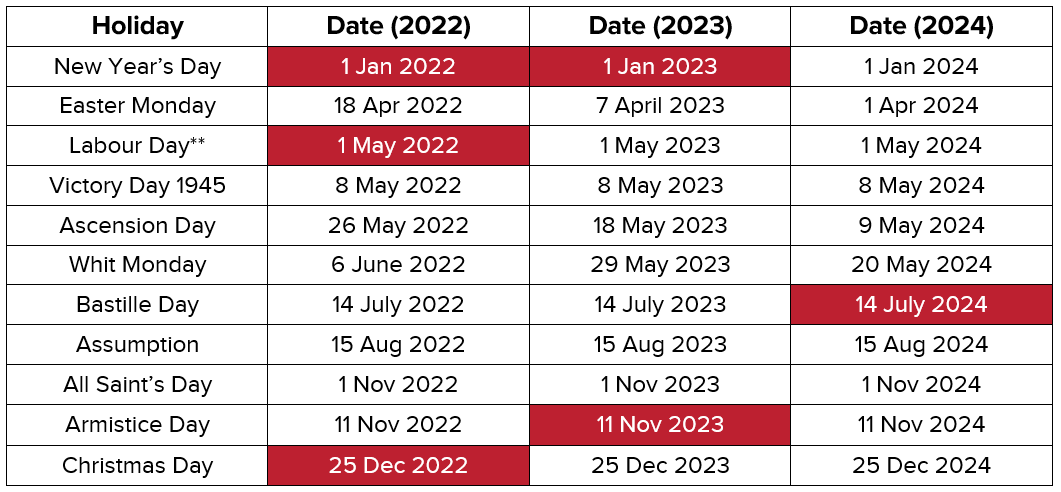Are you an employer expanding your business to France or considering it?
Famously employee friendly, France has strict laws and protections for workers. Here are the leave entitlements and holidays you should be aware of.
Public Holidays

Note: Public holidays that fall on weekends (coloured in red) are not moved to the next working day.
**Most workplaces are shut for Labour Day; however, depending on your collective bargaining agreement (CBA), you may have to work on Labour Day. In that case, you will receive double pay.
Annual Leave
The annual leave entitlement is calculated from 1 June to 31 May. Full-time employees (working a 35-hour week) accrue 2.08 working days a month, resulting in 25 weekdays of annual leave a year.
The acquisition of annual leave is automatic and begins as soon as the employee starts. It is worth noting that in France, unlike other countries, certain periods during which the contract is suspended, such as maternity leave, are considered by law as effective working time. As such, the employee continues to accrue leave during that time.
Typically, annual leave cannot be rolled-over to the next year. However, there are some exceptions, such as; maternity leave, sick leave, or heavy workload (where it is impossible to take time off), where it can be granted at the company’s discretion.
Sick Leave
Within 48 hours of stopping work due to an illness, you must provide a sick note to both your employer and France’s national health insurance organisation, Caisse Primaire d’Assurances Maladie (CPAM). Depending on the collective bargaining agreement (CBA) for the sector you work in, the company may keep paying your salary until CPAM pay comes into effect.
On the fourth day of sick leave, you can claim sick pay, which will be provided by CPAM. Since 1 May 2022, the daily allowance is capped at 48.69 euros. Be aware that there are strict conditions in receiving sick pay in France; be sure to follow your doctors’ directives. Failure to do so could result in suspended pay.
Also, in the event of sick leave exceeding 30 calendar days, the employee will require a ‘return visit’. This must occur within 8 days of resuming work, and involves an inspection at the workplace, with the company’s occupational physician. Note, that as of 1 April 2022, a medical visit can be arranged prior to returning to work, if requested by the employee, occupation physician, General Practitioner (GP) or CPAM.
Long-term sick leave, although dependent on your contract, typically comes into effect after 30 continuous days of sick leave elapses. In the event of this, your salary payment will be made by your life insurance provider (prévoyance).
Paid Caregiver Leave
From 1 October 2020, employees, self-employed persons and job seekers are eligible to take up to three months paid leave to take care of a relative or close friend. In the event of extended or multiple leaves, the leave is capped at one year over the course of their working career
Maternity Leave
Expectant mothers are given 16 weeks in total of maternity leave; six weeks before the birth, and ten weeks after. However, the weeks entitled do change depending on how many children the mother is expecting, and any dependent children they might have. It is mandatory to take at least eight weeks of maternity leave.

France offers a Daily Maternity Allowance, which is provided by CPAM. The daily wage is calculated based on:
- The addition of the last three gross salaries from the last 3 months / 91.25 = daily wage
- The minimum amount is 9.77 euros
- The maximum amount is 89.03 euros
- The employer can, at their discretion, complete the remainder salary; in some cases it’s required by their CBA.
This allowance is paid every 14 days.
At the end of maternity leave, you will resume either your previous job, or one in a similar position with equal pay. Within 8 days of returning to work, you must undergo a return visit, which is undertaken with the company’s occupational physician. You will not be allowed to return to work until the physician gives the all-clear. During this time, you are also entitled to meet with your employee to discuss career guidance.
Paternity Leave
Leave is eligible to be taken for any employee who has worked at least one year at the company. Fathers are entitled to 25 calendar days of paternity leave. Four days compulsory leave right after childbirth, and in the following six months, 21-day leave is accessible at any time.
The leave is to be taken in two instalments, with a minimum of five days for each leave. In the event of multiple births, the 21 days becomes 28-day paternity leave.
Reduction of Working Time (Reduction du temps de travail)
Reduction du temps de travail (RTT) are compensation days (or, sometimes called rest days) awarded for unpaid overtime. Enacted in January 2000, the legal working time became 35 hours a week (down from 39 hours) , which applied to private companies with 20 or more employees. However, employers were given the option of maintaining the 39-hour week, on the condition that they provide RTT days for their employees.
RTT is accrued monthly, and must be used by the end of the calendar year. RTT is determined by hours worked, the employment contract, and working time.
Contrat à temps complet (hourly contract)
Employees can either be paid for weekly hours exceeding 35, or it can be compensated in RTT.
Forfait jours (daily contract)
Employees work is not calculated by hours, but by days worked. On this contract, the RTT is calculated by:
Days in the year, minus:
– Number of vacation days
– Number of weekend days
– Number of bank holidays (on weekdays)
– Number of worked days
= Total RTT (For the year)
Adoption Leave
In the case of adoption, employees are entitled to 10 weeks of parental leave for one child; for multiple children, it’s 22 weeks. The leave allowance, however, is expected to be shared by both parents.
Knowing what you and your employees are entitled to is essential when expanding overseas. Be sure to regularly review existing labour laws and keep an eye out for new ones that may be introduced. Consider conducting an HR audit to ensure you’re fully compliant with French labour laws.













 June 8, 2022
June 8, 2022 








